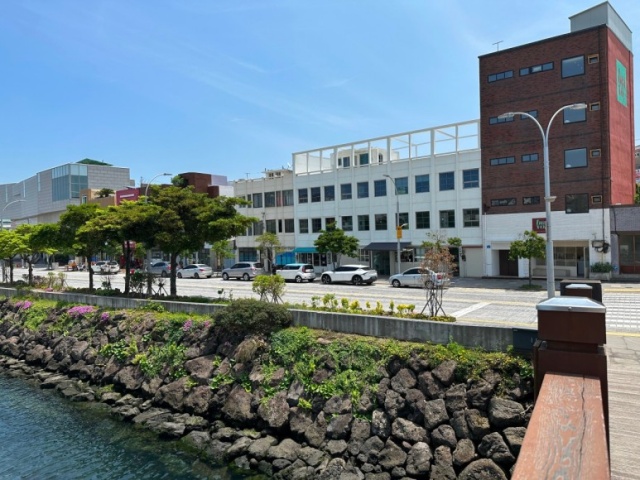|
Despite the drizzly weather, people were lining up, eager to try something special.
Upon arriving at Jeju International Airport, the Gen MZ (the Millennials and Gen Z) tourists immediately gathered in front of the store, exclaiming, "Since we're in Jeju, we must definitely try the local flavors." They wasted no time and hopped into rental cars to head straight to the shop.
| |
 |
|
| Photo: UMU SNS |
The said shop is a Jeju tourism start-up called 'Umu,' which uses agar gathered by Jeju Haenyeo to make puddings for sale.
In addition to creating unique puddings using locally sourced ingredients from Jeju, Umu also develops and sells products like soap and hand cream, all of which showcase the distinctiveness of Jeju's local flavors.
After being selected as one of the recipients of the 'J-Start-up' 2nd cohort, a program supported by Jeju government and the Jeju Tourism Organization to discover and assist tourism start-ups based in Jeju, Umu has been running its business successfully for five years since its selection in 2019.
Umu opened its first store in Hanllim-eup, Jeju City, and then opened its second branch in the original city center of Jeju in 2020, amid COVID-19.
As the pandemic blocked international travel routes, many domestic tourists turned to Jeju for their travel destination. During this period, Jeju tourism start-ups captivated the taste and preferences of these local tourists, offering them unique experiences and products.
The emergence of the store has sparked a change in the area where the donut effect took place in the past and forced the city to enter a period of stagnation.
In an area where it seemed like no new business would thrive, tourists, not just locals, started to visit these establishments, bringing a wind of change to the neighborhood.
Jeju’s original city center has now disappeared, leaving only traces of the area once known as Jeju-sung (castle). It includes four neighborhoods in its administrative division: Ildo 1(il)-dong, Geonip-dong, Samdo 2(i)-dong, Ido 1(il)-dong.
In the past, various government agencies such as the Jeju Provincial Office, Jeju Special Self-Governing Provincial Office of Education, and police station, as well as universities, high schools, and commercial and financial facilities, were concentrated in Jeju’s original city center and its surrounding areas. This concentration of institutions made it a central hub for fashion and shopping, often referred to as the 'Myeongdong of Jeju.'
The problem arose when urban development occurred in the outskirts of Jeju’s original city center, leading to the relocation of major administrative and educational institutions. As a result, the city center area fell into a period of stagnation for about 30 years.
| |
 |
|
| Photo: UMU SNS |
According to Park Ji-hoon, the CEO of 'Umu,’ he noticed that many alleys were stagnant when he first arrived in the original city center area, and there were no tourists coming in. However, after successfully running a store in Hanllim-eup, he observed that nearby businesses started to change as tourists began to visit. This experience led him to believe that opening a second store in Jeju’s original city center would bring about positive changes and developments in the area.
Park generously lent a helping hand to nearby store owners by recommending menus and preferences favored by young tourists, leading to remarkable results in their efforts to thrive together.
During the initial stages of the business, there were fewer than 10 establishments within a 100m radius of the store. However, the number of cafes and restaurants in the vicinity has grown to 20-30.
One establishment, which used to be a bar, underwent a transformation based on Park’s recommendation. They changed their business type to exclusively serve bomaltotkalguksu (Noodle Soup with Brown Turban Shell.) As a result, the place has become a famous spot, with people lining up to try their specialty.
'Horsemeat Research Institute' is a famous restaurant where people line up even before its opening, offering Jeju's flagship specialty, horsemeat, in a way that suits the preferences of the Gen MZ.
As the restaurant thrived, new establishments began to spring up one by one in the surrounding area.
Just a week ago, a new cafe opened right in front of the restaurant, and nearby, new buildings are being built, contributing to the revitalization of the original city center and its overall vibrancy.
Tourists seeking these Jeju tourism start-ups also headed towards the areas around Jeju’s original city center.
| |
 |
|
| Tamna Cultural Square |
The area around Dongmun Market and Jeju Tamna Cultural Square is also undergoing significant changes.
The area mentioned, located in the downstream of Sanjicheon, a river that runs through Jeju’s original city center, has been plagued by issues of homelessness, public drunkenness, and solicitation for prostitution during the nighttime.
However, starting from 2020, with the selection of 'Zero Point Trail' as part of the 3rd cohort of the 'J-Start-up' program, along with the establishment of several new businesses, a transformation has begun to take place in the area.
| |
 |
|
| Zero Point Trail |
Aram Yoo, the CEO of Zero Point Trail, which operates a challenge program where participants walk from the sea-level point on Sanjicheon to the summit of Mt. Hallasan on foot, mentioned that during the early stages of their business in 2020, program participants would arrive as early as 3 to 4 AM. At that time, solicitation for prostitution was prevalent in the area.
Yoo further added, "Although it hasn't completely disappeared, the situation has changed significantly. In the past, as early as 6 PM, people would stay off of this area due to its notorious reputation. However, now we see people coming here to enjoy a drink or have a meal, and it feels like the winds of change are blowing in this place." |























